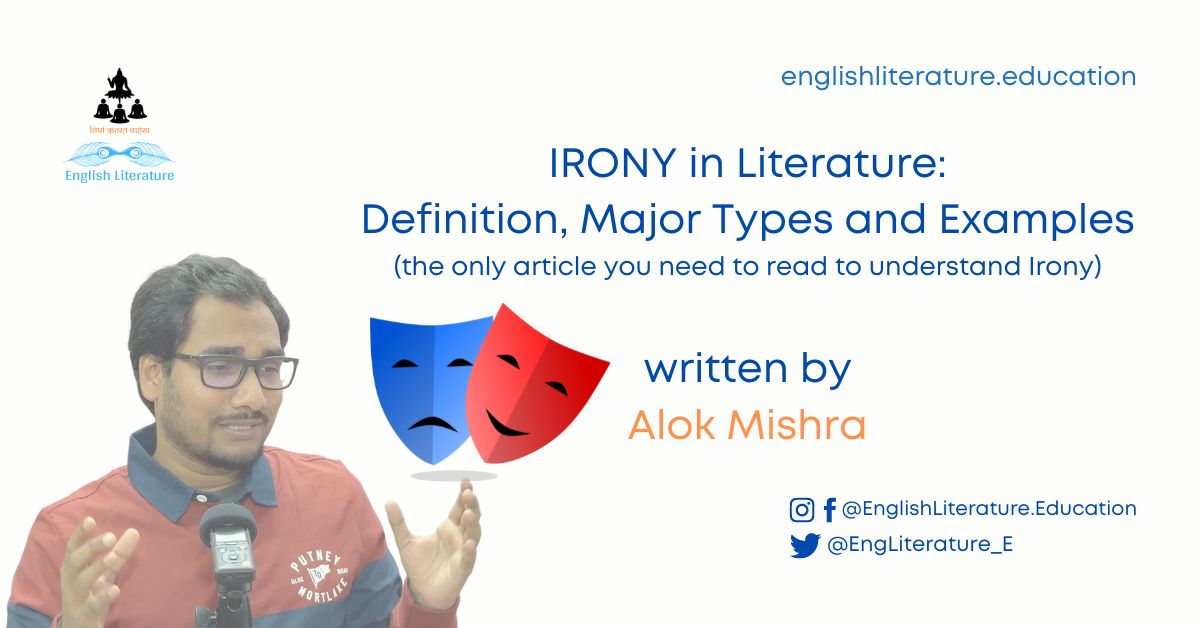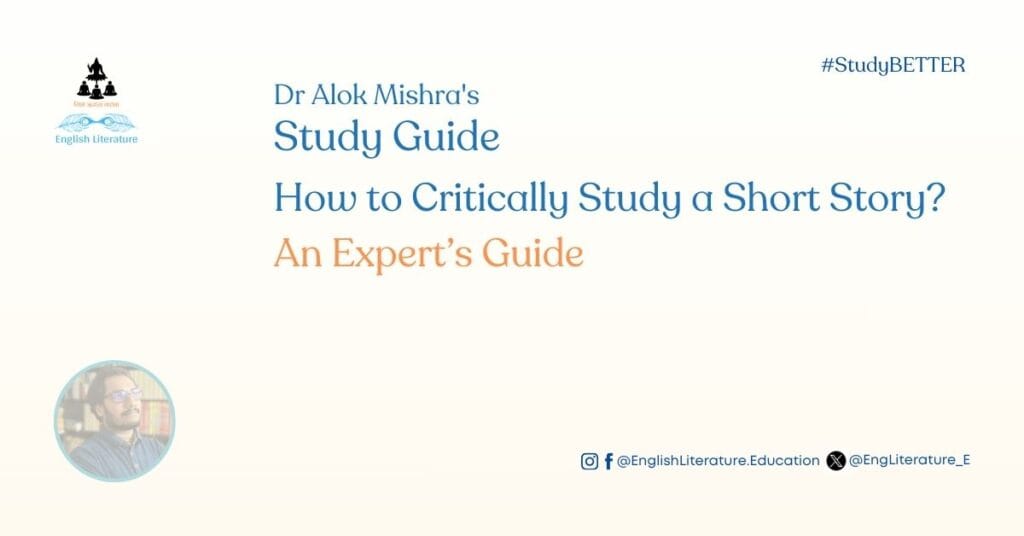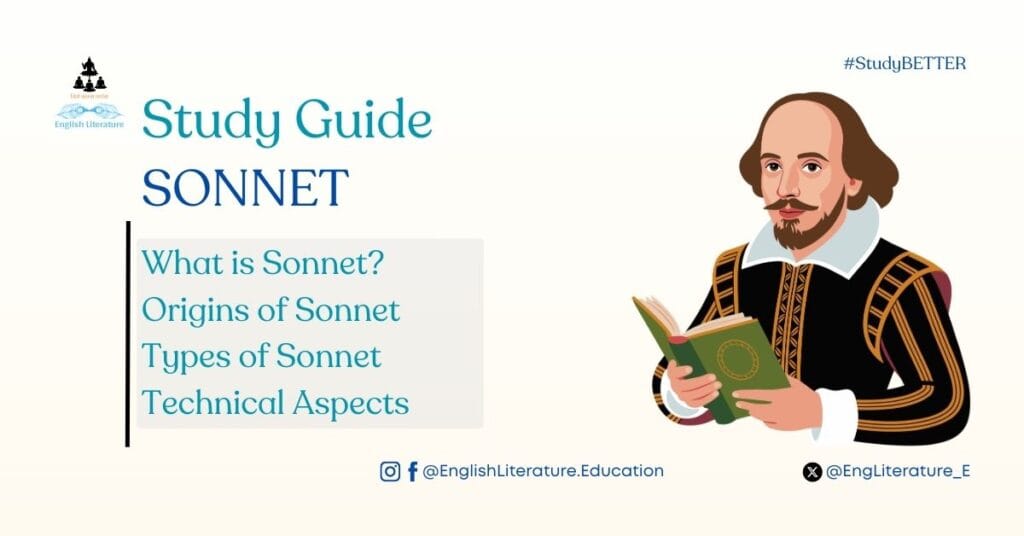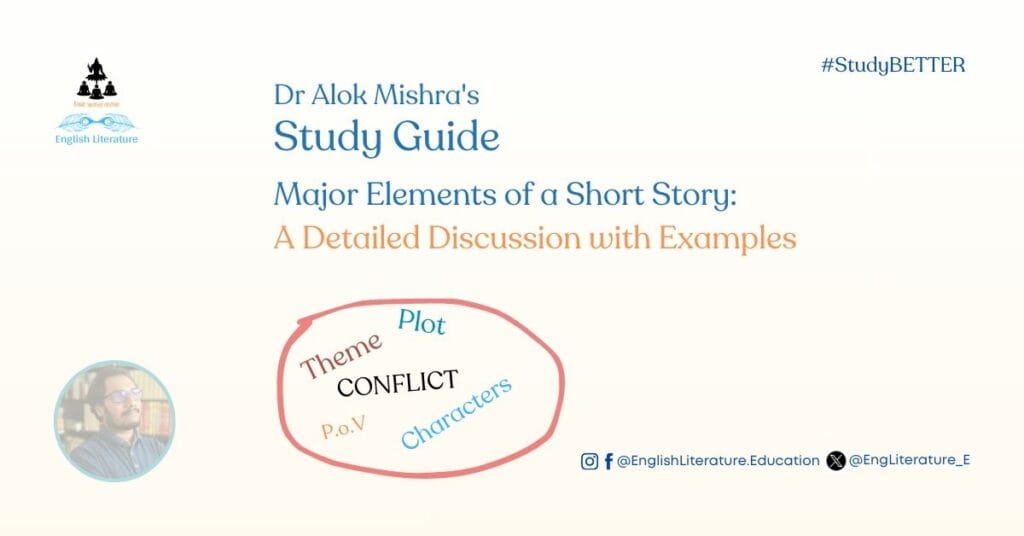Irony is a word that every literature student hears frequently in the classroom. While reading a literary note or watching a video on YouTube, this term frequently appears. Irony, we can assume, is a common term often encountered by those studying literature, English or any other language. The question of the hour for many is ‘what is irony?’. All those who have come to this page seeking a general definition of irony and its application in the literary context, please ensure you read this page to the end. In this article, I will not only define irony in literature but also add types of irony, their examples and some popular instances in literature to make you understand everything in the best possible way.
In general terms, irony is an expression that means (generally) opposite to what it supposedly conveys. “Ah, it was an amazing day!” Imagine someone expressing this after losing his wallet in the street to a pickpocket. That’s an example of irony in expressions. The term irony, at times, also means a situation that is commonly opposite to or not exactly what someone imagined. For instance, a person spends all night thinking about ‘tomorrow’ when they finally get to see Leo Messi play live. However, the match is somehow cancelled tomorrow. That’s irony.
In a literary context, Irony is a powerful literary device that adds depth and complexity to a narrative. It involves a discrepancy (or deviation in simple terms) between what is expected or intended and what actually occurs, creating a contrast that often reveals deeper truths or critiques. The intended discrepancy can be in expressions, occurrence or the very scheme of the work of literature (of concern). Irony, as a literary device, works on multiple levels, offering a range of effects and engaging readers in a process of interpretation and exploration.
To simplify this concept, irony can be understood as a literary tool that uses unexpected twists or contradictions to create an impact on the audience and provoke thought.
Want to listen to this article? You can tune into Spotify and listen to this episode on irony. Just hit the play button below:
Types of Irony in literature:
In literature, there are many types of irony critics have noted. However, among these types, a few can be clubbed together to create a comprehensive one. Before we discuss the major types of irony in literature, have a look at the names and brief introductions to some prominently identified ironies.
- Verbal Irony: A character says one thing but means another, mostly the opposite.
- Situational Irony: Mostly comic, and at times tragic or another kind of contrast between what is expected to happen and what actually occurs.
- Dramatic Irony: The audience or readers understand that a character does not, leading to a difference in understanding or interpretation of events.
- Cosmic Irony: The universe seemingly conspires against the intentions of characters, mainly resulting in a bitter or cruel outcome.
- Socratic Irony: A speaker feigns ignorance or adopts a naive stance to expose the flaws or contradictions in someone else’s argument.
- Romantic Irony: A form of self-conscious irony that calls attention to the limitations and complexities of human experience and perception.
- Historical Irony: Occurs when, in a work of literature, events unfold in a way that contradicts expectations based on historical context or knowledge.
- Tragic Irony: The audience or reader knows that a character’s actions or choices will lead to downfall or loss, while the character remains unaware.
- Structural Irony: The overall structure or organisation of a work creates irony, often through juxtaposition or contrasts of various kinds.
4 Major Types of Irony in Literature: A Detailed Discussion with Examples
Verbal irony: This is the form of irony frequently found in literature across genres. It occurs when a character or narrator says something but means the opposite, most of the time, or an overestimated or underestimated version of the thing being said. Finding examples of verbal irony in literature is relatively easy. Just read the novels by Austen, the poems by the poets of the Neo-classical age, or the works by Jonathan Swift. In Jonathan Swift’s “Gulliver’s Travels,” Gulliver mockingly describes the tiny Lilliputians as a great and mighty nation. However, readers can easily discern the irony lurking in the description, as they are physically small and their power is laughably inadequate. Moreover, it serves a purpose beyond amusement. By employing verbal irony, Swift powerfully satirises political and social institutions, offering a critique of human vanity and the follies of society. So, you can see that verbal irony may serve many purposes at the same time – extending its use beyond amusement in literature.
Situational irony: Unlike verbal irony, situational irony arises when there is a contrast between what is expected to happen and what actually takes place. Therefore, it is in the art of the author or the poet – how skilfully and craftily the plot accommodates such dramatic and ironic changes. In F. Scott Fitzgerald’s “The Great Gatsby,” the eponymous character Jay Gatsby throws lavish parties to attract the attention of his beloved Daisy Buchanan, only to discover that she does not attend these extravagant gatherings. And thus, we can say that by the craft of the author, this situational irony occurs in the story. Beyond being a situation that falls short of the protagonist’s expectations, situational irony also highlights the futility of Gatsby’s efforts and the emptiness of his pursuit of the American Dream. Try finding more instances of such situational irony in the works you read.
Dramatic irony: Dramatic irony, unlike the other two forms of irony mentioned above, involves the audience as well. It occurs when the audience or reader possesses knowledge that a character does not have. This lack of information on the part of the character may lead to confused actions or misleading interpretations, creating an ironic impact on the work of literature and affecting the audience as well. In William Shakespeare’s “Romeo and Juliet,” the audience is aware that Juliet has taken a sleeping potion to feign death. Still, Romeo, upon seeing her seemingly lifeless body, believes she is truly dead. Consequently, a romantic ending turns into a tragic conclusion leaving the audience in shock. This dramatic irony intensifies the tragedy of the play, as the audience is privy to information that could alter the course of events if the characters were aware of it.
Cosmic Irony: As the name suggests, this is a form of irony that reflects a larger sense of fate or destiny at work. With his artistic skill in weaving the plot and storyline, the author or poet exhibits events in a sequence that reflects the greater impact of the characters’ destiny rather than their actions. To give a contextual sense of it, it occurs when the universe seems to conspire against the desires or intentions of characters, often resulting in a bitter or cruel outcome. A prime example of cosmic irony can be found in Thomas Hardy’s novel “Tess of the d’Urbervilles.” Despite Tess’s undying efforts to escape her tragic past and start her life anew, she is relentlessly pursued by misfortune, ultimately leading to her tragic downfall. And that’s how an author makes the cosmos work against a character! The cosmic irony in this narrative emphasises the cruel forces of fate that dictate Tess’s life… and Tess’s life may symbolise the trivial nature of ephemeral human life – merely puppets in the hands of fortune and powers that be!
Conclusion:
Among many literary devices that authors employ to add emotional and thoughtful dimensions to their works, irony is a major tool. Irony adds amusement, tragic consequences, or just that little extra punch to the satirical impact in arguments, situations, or the overall impact of the literary work. Jane Austen is known for her illustrious use of verbal irony in her novels. Thomas Hardy’s works, in most cases, are full of instances of situational and cosmic irony. Tragedies and comedies by Shakespeare have amply exhibited dramatic irony in full force. Othello slipping into the web of doubts, Rosalind disguises herself as a man and tests the love of Orlando, the nightmare comedy of A Midsummer Night’s Dream… and so on… Irony was utilised by authors like Swift and poets like Pope to convert bitter but essential messages to the audience.
I hope I have covered this topic sufficiently in the article. If there’s something else you’d like to understand, please mention it in the comments, and I’ll do my best to address your concerns. All the best!
Read Next: Anticlimax in Literature
Alok for English Literature Education





8 Comments. Leave new
Impeccably evaluated
Many thanks for this amazing article… friends! I came here after reading a few articles on irony in literature on different websites. Most of them were paid and demand money. This one is free of cost and I think a little comfortable for Indian students of English literature. Keep going guys! You people rock!
Very helpful! I was looking for simple but comprehensive definition of irony in literary context. Got it here. Also the types of irony with examples. Thanks very much!
Very helpful article. I was confused about irony in literature. It helped me a lot. I have also shared this article with all my friends in the second year English literature, BA group. Keep doing this stuff guys. Your site is very simple to read and amazingly helpful.
Thanks for this amazing article… I have downloaded many pdf documents, articles and visited many websites. Even paid some money to some websites to just understand what is irony in literature. I could not. This article helped me understand the concept in no time. I knew about types and definitions of different ironies as well. Please keep doing amazing things on this website. It will help us a lot.
Wonderful article… Irony was always a complex thing for me to understand… this article helped me a lot in understanding the basics as well as the types and examples of irony of different kinds.
Very nicely explained article on irony… I was confused about socratic irony. Well this article helps understand different types of ironies in better perspectives with examples. Can you please explain socratic irony in a little more detail. Is it important in literature? Please tell. Thanks
Thank you, Sandip! We hope you enjoyed reading this article and understood the meaning of irony. We keep bringing such articles to our platform. Keep checking for more.